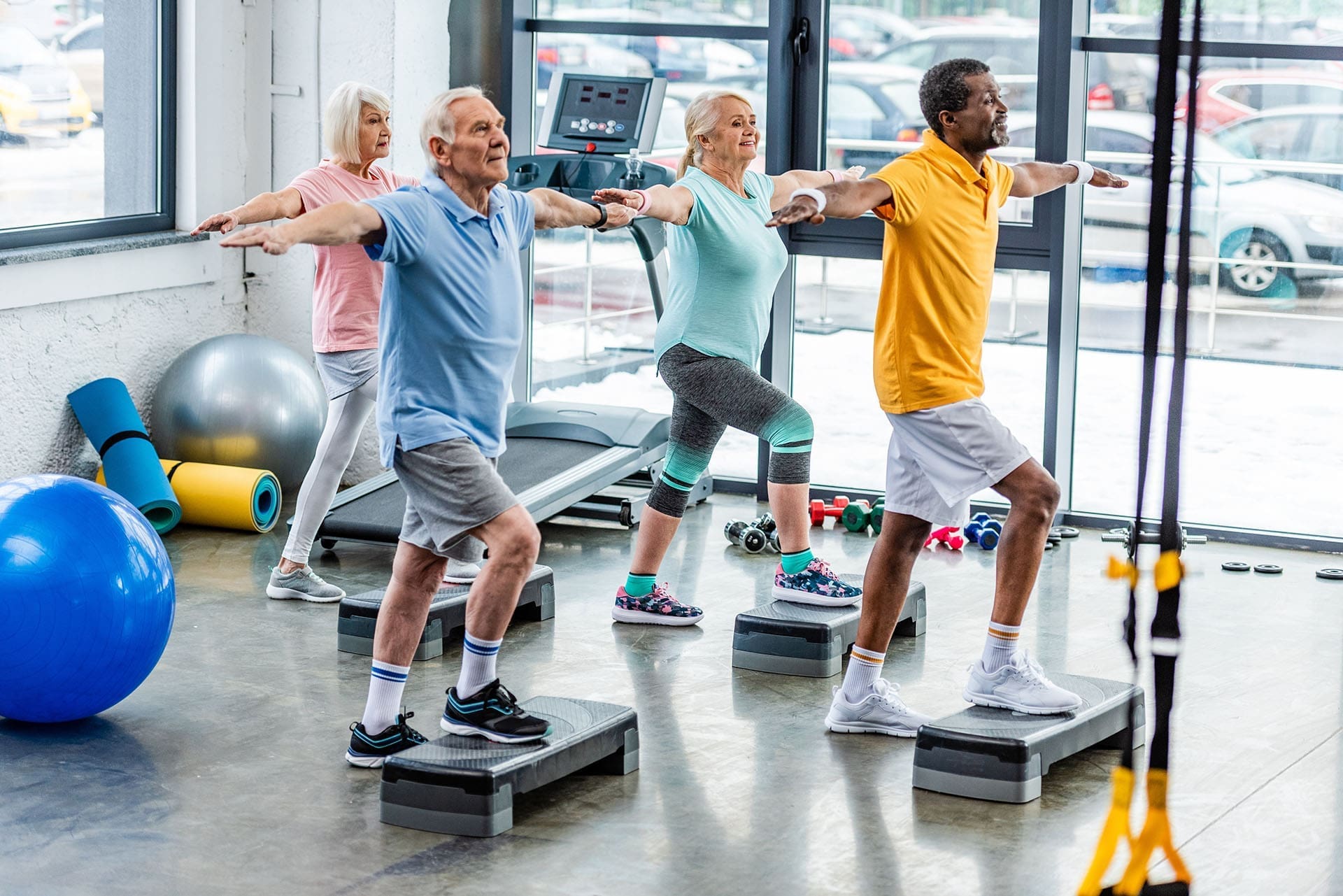Exercise and Dementia: Improve Brain Function
Can daily exercise improve the health of older people and lower their risk of getting dementia?

Exercise and the Prevention of Dementia
Dementia is a term that refers to a variety of diseases that impede memory and cognition, and it is presently the seventh most common cause of death worldwide. (World Health Organization, 2025) Every year, about 10 million new cases of dementia are found around the world. (Yoon J.H. et al., 2023) A study investigating the correlation between insulin and exercise in the brain discovered that consistent physical activity may enhance brain function and reduce the likelihood of developing dementia. Researchers have found that factors such as.
- High Blood Pressure
- High blood sugar
- Age
- Increases the risk of acquiring dementia. (World Health Organization, 2025)
Workouts and range of motion are required to be performed on the muscles. In those who do not engage in physical activity, their muscles grow tight, which makes it more difficult for insulin to do its assigned function. The muscles are compressed and loosened up due to the body’s movement, which results in the body being more receptive to insulin. Discovering methods to lessen the body’s resistance to insulin could be beneficial in preventing dementia.
Exercise and A Lowered Risk
Over two weeks, researchers observed 21 senior adults with prediabetes and discovered that exercise directly enhances cognitive function by assisting the brain in regulating insulin. The participants participated in 12 moderate-to-high-intensity supervised exercise sessions. (Malin S. K. et al., 2025)
- The discovery showed a big rise in brain-derived extracellular vesicles that carried insulin-associated proteins.
- These minuscule transmitters facilitate neuronal communication and are essential for brain maintenance.
- AKT, also known as protein kinase B (PKB), is a set of three serine/threonine-specific protein kinases important for many cellular activities, such as cell proliferation, metabolism, and the cell cycle.
- The protein is suspected to be a significant factor in insulin signaling and has implications for the health and growth of neuronal cells.
- The notion that exercise can help prevent dementia by potentially enhancing insulin signaling is important because poor insulin response can result in dementia.
While further research is needed, these findings suggest that physical activity may be an accessible and low-cost strategy to promote long-term brain health. In the next part of the investigation, researchers will utilize an insulin spray and MRIs to learn more about how insulin impacts brain function. To further understand the effect of the insulin spray, they will evaluate blood circulation in the brain before and after it is administered.
Insulin and Physical Activity Are Crucial for Cognitive Health
Insulin is a hormone synthesized by the pancreas and is responsible for regulating blood sugar. Nevertheless, its significance in the preservation of mental health is equally critical. Insulin’s binding to insulin receptors in the brain facilitates neuronal communication and fortifies synaptic connections, which are essential for memory and learning. (Gray, S. M., Meijer, R. I., & Barrett, E. J. 2014)
The brain is more likely to lose its abilities if it doesn’t get enough insulin signals, which can happen in situations like type 2 diabetes. (Yoon J.H. et al., 2023) Researchers observed that insulin resistance helped amyloid-beta plaques and tau tangles build up, which are two of the main signs of Alzheimer’s disease. (Hong, S., Han, K., & Park, C. Y. 2021) These cognitive changes may be slowed or even prevented by enhancing insulin sensitivity. Aerobic exercise, in particular, has an advantageous impact on the brain’s overall health. Previous research has demonstrated that adults can improve or preserve their cognitive and memory abilities through physical activity. (Rosenberg A. et al., 2020) Other things you may do to make your brain healthier are
- Being socially active
- Challenging the mind
- Getting a good night’s sleep
- Dealing with stress
- Eating well
- Being active
- Taking care of diabetes
- Controlling blood pressure
The future of dementia prevention will likely involve a combination of lifestyle interventions, including exercise and medications, to achieve the most significant impact. Regular exercise has the potential to substantially reduce the risk of dementia in individuals with diabetes or prediabetes and to support the maintenance of optimal brain health.
Clinic for Chiropractic Care and Functional Medicine after Injury
Family Practice Nurse Practitioner Dr. Jimenez integrates chiropractic care with sophisticated medical expertise to treat various conditions. Our clinic employs Functional Medicine, Acupuncture, Electro-Acupuncture, and Sports Medicine to develop personalized care plans that foster long-term wellness, mobility, and natural healing. We enable patients to thrive, regardless of age or health challenges, by emphasizing strength, agility, and flexibility. At El Paso’s Chiropractic Rehabilitation Clinic & Integrated Medicine Center, we are dedicated to treating patients who have sustained injuries or are suffering from chronic pain syndromes. Our primary objective is to enhance your capabilities by providing customized programs for all age groups and disabilities, including agility, mobility, and flexibility. We implement comprehensive care plans and in-person and virtual health guidance to guarantee that each patient receives personalized care and achieves optimal wellness.
Is Moving Important for Healing?
References
World Health Organization. (2025). “Dementia.” World Health Organization. from https://www.who.int/news-room/fact sheets/detail/dementia#:~:text=Alzheimer%20disease%20is%20the%20most,60%E2%80%9370%25%20of%20cases.
Yoon, J. H., Hwang, J., Son, S. U., Choi, J., You, S. W., Park, H., Cha, S. Y., & Maeng, S. (2023). How Can Insulin Resistance Cause Alzheimer’s Disease?. International Journal of Molecular Sciences, 24(4), 3506. https://doi.org/10.3390/ijms24043506
Malin, S. K., Battillo, D. J., Beeri, M. S., Mustapic, M., Delgado-Peraza, F., & Kapogiannis, D. (2025). Two weeks of exercise alters neuronal extracellular vesicle insulin signaling proteins and pro-BDNF in older adults with prediabetes. Aging cell, 24(1), e14369. https://doi.org/10.1111/acel.14369
Gray, S. M., Meijer, R. I., & Barrett, E. J. (2014). Insulin regulates brain function, but how does it get there?. Diabetes, 63(12), 3992–3997. https://doi.org/10.2337/db14-0340
Hong, S., Han, K., & Park, C. Y. (2021). The insulin resistance by triglyceride glucose index and risk for dementia: population-based study. Alzheimer’s research & therapy, 13(1), 9. https://doi.org/10.1186/s13195-020-00758-4
Rosenberg, A., Mangialasche, F., Ngandu, T., Solomon, A., & Kivipelto, M. (2020). Multidomain Interventions to Prevent Cognitive Impairment, Alzheimer’s Disease, and Dementia: From FINGER to World-Wide FINGERS. The Journal of Prevention of Alzheimer’s disease, 7(1), 29–36. https://doi.org/10.14283/jpad.2019.41
Post Disclaimers
General Disclaimer, Licenses and Board Certifications *
Professional Scope of Practice *
The information herein on "Exercise and Dementia: Improve Brain Function" is not intended to replace a one-on-one relationship with a qualified health care professional or licensed physician and is not medical advice. We encourage you to make healthcare decisions based on your research and partnership with a qualified healthcare professional.
Blog Information & Scope Discussions
Welcome to El Paso's Premier Wellness and Injury Care Clinic & Wellness Blog, where Dr. Alex Jimenez, DC, FNP-C, a Multi-State board-certified Family Practice Nurse Practitioner (FNP-BC) and Chiropractor (DC), presents insights on how our multidisciplinary team is dedicated to holistic healing and personalized care. Our practice aligns with evidence-based treatment protocols inspired by integrative medicine principles, similar to those on this site and on our family practice-based chiromed.com site, focusing on naturally restoring health for patients of all ages.
Our areas of multidisciplinary practice include Wellness & Nutrition, Chronic Pain, Personal Injury, Auto Accident Care, Work Injuries, Back Injury, Low Back Pain, Neck Pain, Migraine Headaches, Sports Injuries, Severe Sciatica, Scoliosis, Complex Herniated Discs, Fibromyalgia, Chronic Pain, Complex Injuries, Stress Management, Functional Medicine Treatments, and in-scope care protocols.
Our information scope is multidisciplinary, focusing on musculoskeletal and physical medicine, wellness, contributing etiological viscerosomatic disturbances within clinical presentations, associated somato-visceral reflex clinical dynamics, subluxation complexes, sensitive health issues, and functional medicine articles, topics, and discussions.
We provide and present clinical collaboration with specialists from various disciplines. Each specialist is governed by their professional scope of practice and their jurisdiction of licensure. We use functional health & wellness protocols to treat and support care for musculoskeletal injuries or disorders.
Our videos, posts, topics, and insights address clinical matters and issues that are directly or indirectly related to our clinical scope of practice.
Our office has made a reasonable effort to provide supportive citations and has identified relevant research studies that support our posts. We provide copies of supporting research studies upon request to regulatory boards and the public.
We understand that we cover matters that require an additional explanation of how they may assist in a particular care plan or treatment protocol; therefore, to discuss the subject matter above further, please feel free to ask Dr. Alex Jimenez, DC, APRN, FNP-BC, or contact us at 915-850-0900.
We are here to help you and your family.
Blessings
Dr. Alex Jimenez DC, MSACP, APRN, FNP-BC*, CCST, IFMCP, CFMP, ATN
email: [email protected]
Multidisciplinary Licensing & Board Certifications:
Licensed as a Doctor of Chiropractic (DC) in Texas & New Mexico*
Texas DC License #: TX5807, Verified: TX5807
New Mexico DC License #: NM-DC2182, Verified: NM-DC2182
Multi-State Advanced Practice Registered Nurse (APRN*) in Texas & Multi-States
Multi-state Compact APRN License by Endorsement (42 States)
Texas APRN License #: 1191402, Verified: 1191402 *
Florida APRN License #: 11043890, Verified: APRN11043890 *
Colorado License #: C-APN.0105610-C-NP, Verified: C-APN.0105610-C-NP
New York License #: N25929, Verified N25929
License Verification Link: Nursys License Verifier
* Prescriptive Authority Authorized
ANCC FNP-BC: Board Certified Nurse Practitioner*
Compact Status: Multi-State License: Authorized to Practice in 40 States*
Graduate with Honors: ICHS: MSN-FNP (Family Nurse Practitioner Program)
Degree Granted. Master's in Family Practice MSN Diploma (Cum Laude)
Dr. Alex Jimenez, DC, APRN, FNP-BC*, CFMP, IFMCP, ATN, CCST
My Digital Business Card
Licenses and Board Certifications:
DC: Doctor of Chiropractic
APRNP: Advanced Practice Registered Nurse
FNP-BC: Family Practice Specialization (Multi-State Board Certified)
RN: Registered Nurse (Multi-State Compact License)
CFMP: Certified Functional Medicine Provider
MSN-FNP: Master of Science in Family Practice Medicine
MSACP: Master of Science in Advanced Clinical Practice
IFMCP: Institute of Functional Medicine
CCST: Certified Chiropractic Spinal Trauma
ATN: Advanced Translational Neutrogenomics
Memberships & Associations:
TCA: Texas Chiropractic Association: Member ID: 104311
AANP: American Association of Nurse Practitioners: Member ID: 2198960
ANA: American Nurse Association: Member ID: 06458222 (District TX01)
TNA: Texas Nurse Association: Member ID: 06458222
NPI: 1205907805
| Primary Taxonomy | Selected Taxonomy | State | License Number |
|---|---|---|---|
| No | 111N00000X - Chiropractor | NM | DC2182 |
| Yes | 111N00000X - Chiropractor | TX | DC5807 |
| Yes | 363LF0000X - Nurse Practitioner - Family | TX | 1191402 |
| Yes | 363LF0000X - Nurse Practitioner - Family | FL | 11043890 |
| Yes | 363LF0000X - Nurse Practitioner - Family | CO | C-APN.0105610-C-NP |
| Yes | 363LF0000X - Nurse Practitioner - Family | NY | N25929 |
Dr. Alex Jimenez, DC, APRN, FNP-BC*, CFMP, IFMCP, ATN, CCST
My Digital Business Card








Comments are closed.